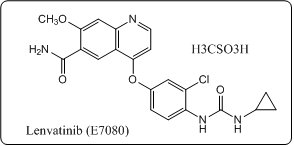- For Print
- June 2, 2011
Eisai Co., Ltd. (Headquarters: Tokyo, President & CEO: Haruo Naito, “Eisai”) announced today that preliminary results of a Phase II study showed that lenvatinib (USAN, Eisai research code: E7080), a multi-targeted kinase inhibitor currently being developed by the company, demonstrated an Objective Response Rate (ORR) of 59% (34/58, 95% CI: 45-71), based on an updated investigator assessment, in patients with advanced radioiodine (RAI)-refractory differentiated thyroid cancer (DTC). These results will be presented during an oral session at the 47thAmerican Society of Clinical Oncology (ASCO) Annual Meeting on June 6, 2011.
The open-label, global, single-arm Phase II study of multi-targeted kinase inhibitor lenvatinib (E7080) involved 58 patients with advanced RAI refractory DTC whose disease had progressed during the prior 12 months. Disease progression was measured using the Response Evaluation Criteria in Solid Tumors (RECIST).
RAI-refractory DTC is a difficult-to-treat and life-threatening form of thyroid cancer, and as treatment options are limited, it constitutes an area of high unmet medical need. Lenvatinib (E7080) is currently being evaluated further in a Phase III trial being carried out in the United States.
The most frequently reported treatment related adverse events in this study of lenvatinib were: hypertension 74% (Grade 3: 10%), proteinuria 60% (Grade 3: 10%), decreased weight 57% (Grade 3: 7%), diarrhea 55% (Grade 3: 10%) and fatigue 53% (Grade 3: 7%). Toxicities were managed with dose reduction in 35% of patients and 23% were ultimately withdrawn from the study due to toxicity.
Eisai is currently focusing its efforts on enhancing its range of products, which includes Halaven®, a novel anticancer discovered and developed in house and approved in the United States, Europe and Japan, lenvatinib (E7080) and farletuzumab (MORAb-003), for the treatment of breast, ovarian, thyroid, endometrial and other types of cancer in the women's oncology arena. Through these efforts, Eisai will make further contributions to address the diversified needs of and increase the benefits provided to cancer patients and their families as well as health care providers as it seeks to fulfill its human health care (hhc) mission.
[ Please refer to the following notes on the lenvatinib Phase II study, thyroid cancer and lenvatinib (E7080) ]
Media Inquiries:
Public Relations Department,
Eisai Co., Ltd.
+81-(0)3-3817-5120
< Notes to editors >
1. About the Lenvatinib (E7080) Phase II Study
The open-label, global, single-arm Phase II study of multi-targeted kinase inhibitor lenvatinib (E7080) in advanced radioiodine (RAI)-refractory differentiated thyroid cancer involved 58 patients with advanced RAI refractory DTC (papillary, follicular or Hurthle Cell) whose disease had progressed during the prior 12 months. (Disease progression was measured using Response Evaluation Criteria in Solid Tumors (RECIST).) The starting dose of lenvatinib was 24 mg once daily in repeated 28 day cycles until disease progression or development of unmanageable toxicities.
2. About Thyroid Cancer
Thyroid cancer refers to cancer that forms in the tissues of the thyroid gland, located at the base of the throat or near the trachea. It affects more women than men and usually occurs between the ages of 25 and 65.
The most common types of thyroid cancer, papillary and follicular (including Hurthle Cell), are classified as differentiated thyroid cancer and account for 95 percent of all cases. While most of these are curable with surgery and radioactive iodine treatment, a small percentage of patients do not respond to therapy.
3. About Lenvatinib (E7080)
Lenvatinib is multi-targeted kinase inhibitor with a unique receptor tyrosine kinase inhibitory profile that was discovered and developed by the Discovery Research team of Eisai's Oncology Unit using medicinal chemistry technology. As an anti-angiogenic agent, it inhibits tyrosine kinase of the VEGF (Vascular Endothelial Growth Factor) receptor, VEGFR2, and a number of other types of kinase involved in angiogenesis and tumor proliferation in balanced manner. It is a small molecular targeting drug that is currently being studied in a wide array of cancer types.

